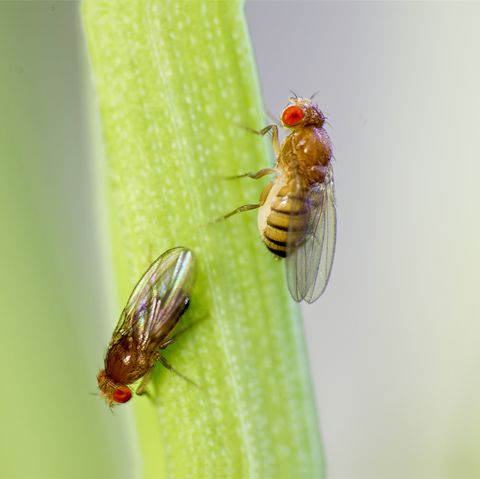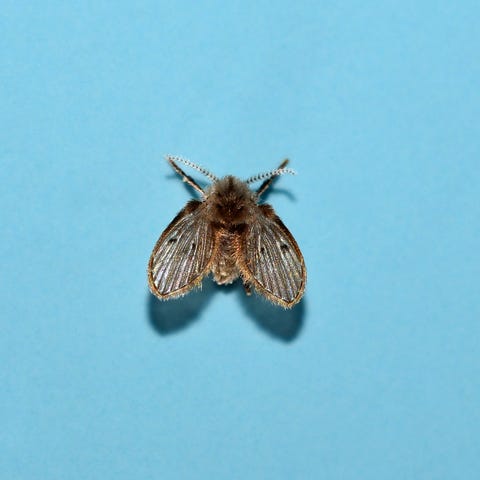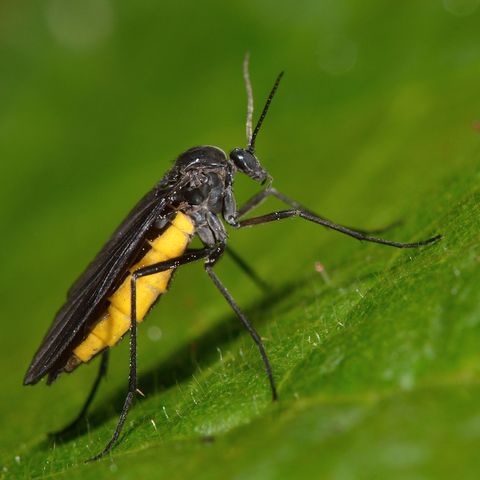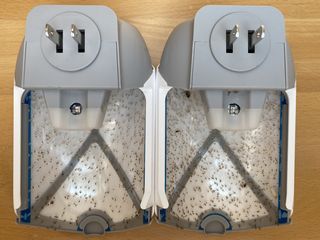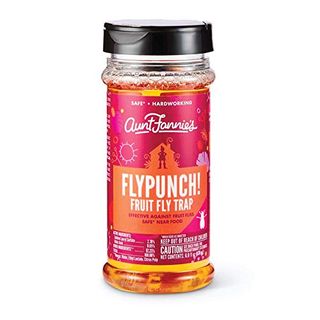It’s funny (well, sort of) how something so tiny can become such a big annoyance. Gnats, flies, no-see-ums — whatever you call them, they can easily take over your house, especially if you forget to wipe up a sugary spill, overwater your plants or let your ripened bananas sit out for one day too many. While they’re unsightly and irritating, these pests won’t do any harm. “Their mouth parts aren’t designed to bite,” explains Chelle Hartzer, an entomologist with Orkin. “There are not any diseases that actually transmit.”
The problem: If you don’t tackle the problem head-on, gnats can quickly take over your home, which may require bringing in a professional pest control company — at an average cost of $200 to $600, depending of the size of your house and scale of the infestation. Luckily, there are easy and effective ways to stop these winged creatures in their tracks and prevent them from coming back. When you catch sight or sound of them, follow this simple guide on how to get rid of gnats.
1 Identify the pest.
Just because there are teeny-tiny bugs flying around doesn’t necessarily mean they’re gnats. Fruit flies, drain flies and fungus gnats are three of the most common offenders, so you’ll need to get up close and personal to see what you’re dealing with.
2 Eliminate their food source.
Fruit flies won’t stick around if they don’t have anything to feast on. The first course of action is to stick produce in the fridge or inside bins as much as possible. It’s best to keep fruit that ripens quickly — like apples, grapes, melons, pairs, peaches and plums — in the low-humidity crisper drawer; produce that is prone to wilting, including leafy greens, carrots and broccoli, belongs in the high-humidity crisper drawer. Bananas are best left on the countertop, ideally in a dedicated banana hanger; once ripe, transfer them to the fridge or peel and store them in the freezer in an airtight container.
You should also rinse and dry fruits and veggies as soon as you get home from the store. “There may be some eggs or very, very tiny larvae,” Hartzer says. “By washing them and storing them properly, fruit flies can’t find that food source anymore.”
It’s not so simple for drain flies. Since they prefer bacteria, sewage and gunk in your drain, garbage disposal or seldom-used toilet, it’s important to clear and clean those plumbing lines frequently, especially during hot, humid weather. For drains, pour in a solution of equal parts baking soda and vinegar, wait five minutes, then follow with boiling water. Stubborn clogs might require a harsher treatment; Hartzer advises using a drain cleaner like Drano Max Gel Clog Remover to flush out the pipes. If the problem persists, an ongoing infestation may indicate a leak, so call a plumber.
To clean the garbage disposal, toss a dozen ice cubes in the chamber, plus 1 tablespoon of baking soda, a few lemon slices and 1 teaspoon of bleach. Turn the disposal on without running water until you hear the grinding stop. Then, with the motor running, flush with cold water for 30 seconds.
As for fungus gnats, exercise your green thumb: Repot your houseplants in new soil. “It’s great for the plant, and it’s great to reduce gnats,” Hartzer explains. But remember: These pests love humidity and moisture, so ease up on the watering. Consider running a dehumidifier in dank parts of the home to keep relative humidity below 50 percent, the point at which gnat-loving bacteria starts to thrive.
3 Lay a trap.
While preventive measures will stop gnats at the source, sometimes it’s best to take immediate action. Here are the most effective ways to get rid of gnats:
✔️ Try a high-tech solution: Plug-in traps can be extremely effective, according to our experts. Consider the Zevo Flying Insect Trap, a GH Seal holder that uses safe amounts of blue and UV light to attract gnats, as well as fruit flies and mosquitoes. “I personally love the Zevo traps that have earned our Seal; I have them in my house all year round,” says Birnur Aral, Ph.D., director of the Good Housekeeping Institute Health, Beauty and Sustainability Lab. “We recently tested the latest version of the product and found it be even more effective at trapping gnats.”
✔️ Try a spray solution: The Zevo Fly, Gnat & Fruit Fly Flying Insect Spray, another GH Seal holder, is also a good option. It uses geraniol and lemongrass oil, which are bio insecticides that don’t need to be registered with the EPA, to kill gnats on contact. Though safe around people and pets, the spray must be handled properly; Zevo cautions against it coming into contact with eyes or skin, and the flammable liquid should never be used near electrical wiring.
✔️ Make a trap with apple cider vinegar and plastic wrap: DIY your own fruit fly trap by pouring a little apple cider vinegar into a glass or just removing the cap from the bottle. Cover the opening with plastic wrap and secure with a rubber band. Then, poke a few small holes in the plastic. The fruit flies will enter but not be able to make their way our.
✔️ Make a trap with a paper cone, vinegar and old fruit: Place a little vinegar and a chunk of very ripe fruit in a jar. Then, roll printer paper into a cone and stick it into the jar, placing the narrow opening down. The smell of rotting produce will help entice the fruit flies into the mixture, but the paper cone will make it difficult for them to escape.
✔️ Drown flies by leaving out a bowl of vinegar and dish soap: Add three drops of dish soap to a bowl of vinegar, and leave it uncovered in problem areas. The soap cuts the surface tension of the vinegar, so the flies that are enticed by the vinegar will sink and drown.
✔️ Put out an almost-empty bottle of old wine or beer: Along with vinegar, fruit flies also like the smell of wine and beer. Leave out an open bottle with a little leftover liquid — the skinny neck will keep the flies trapped. The Old Farmer’s Almanac also recommends using stale beer to attract fruit flies.
✔️ Buy a fail-safe trap: For an easy fix, buy Aunt Fannie’s FlyPunch! on Amazon. The mixture includes sodium lauryl sulfate (a surfactant used in soaps) and malic acid (found in fruit). Just open the top, set it on your counter and watch the cycle of life unfold.
This content is created and maintained by a third party, and imported onto this page to help users provide their email addresses. You may be able to find more information about this and similar content at piano.io

